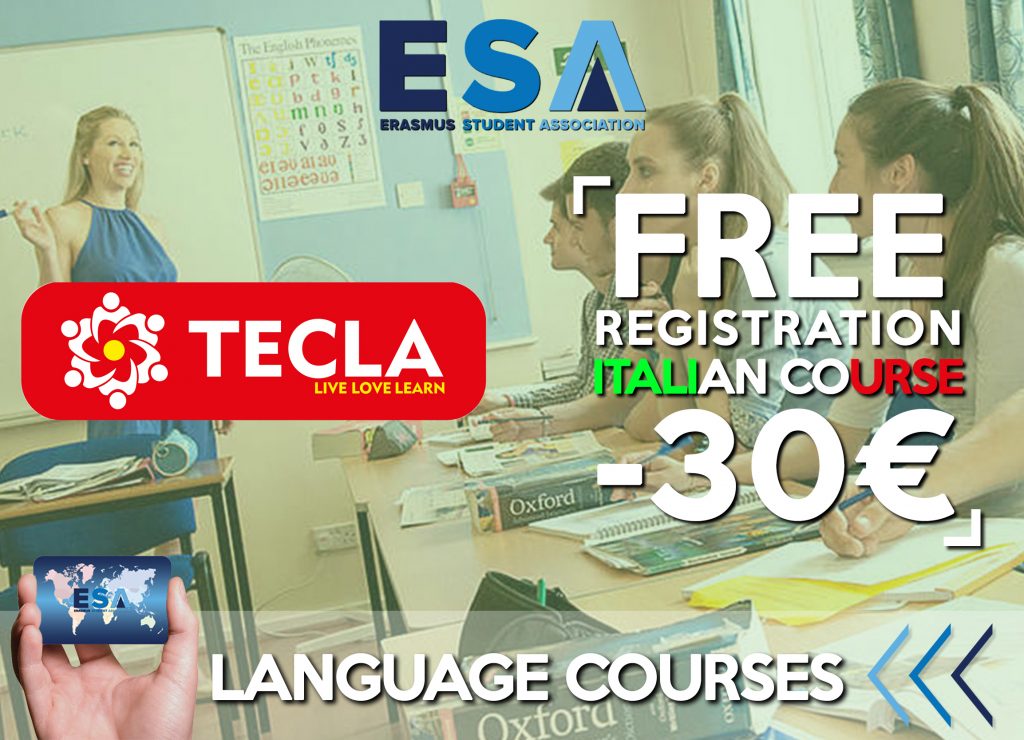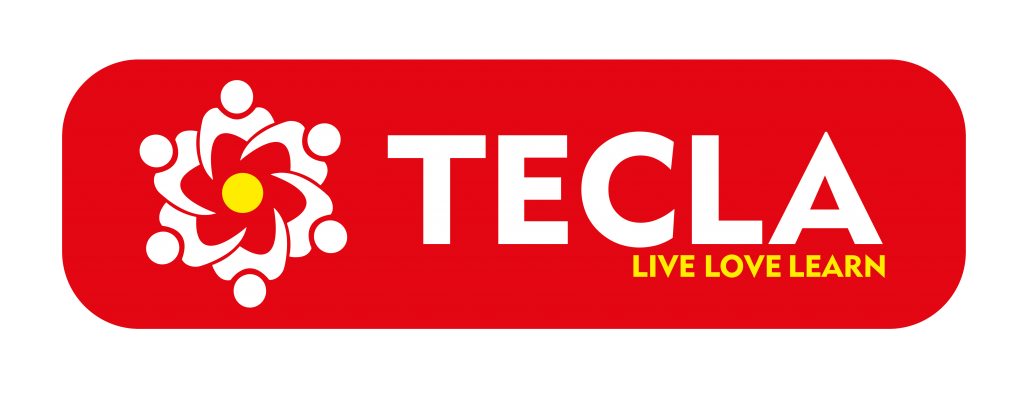
Language Courses
Associazione Culturale Tecla, leader in the teaching of foreign languages, is a ESA Erasmus Student Association Napoli partner.
The language courses at Tecla are managed by highly qualified speaker teachers.
The classes are small (5-7 students maximum); the lessons have a weekly frequency and last for two hours. They take place in the morning, in the afternoon or even in the evening.


Its program develops the four skills: speaking, listening, reading and writing
and respond optimally to all individual needs.
The courses can be arranged in various ways: you can choose a standard course, intensive or decide to focus on one skill (eg. On conversation) etc.
At Tecla it’s also possible to follow courses which amin to obtain certificates attesting the exact level of your language skills (such as: TOEFL, IELTS, DELF, DELE, DITALS).
On request are available individual courses that is an intensive class with a private tutor. This allows to meet particular needs of the student, such as the improvement of pronunciation, vocabulary enrichment, the preparation for a job interview
or a university exam.
THE TEACHING METHOD

The teaching method used is communicative and aims to obtain confidence in the speaking ability. They create situations in which students interact with each other through language that becomes the main and only communication vehicle. The courses are based on a wide range of practical activities that provide students with the skills necessary to communicate effectively in everyday situations related to social life, to travel, to the study, to the job etc ..
PROGRAMS
The course programs are structured according to Common European Framework of Reference for Languages (CEFR).
It sets guidelines to describe the language skills acquired by those who study foreign languages in Europe developed by the Council of Europe, created for providing a shared evaluation scheme for the benefit of training and occupational mobility. The Common European Framework is now accepted as a parameter for assessing the level of individual linguistic competence in Europe.
- The linguistic competence levels
The Common European Framework divides learners into three broad divisions that can be divided into six levels.
Base A1/A2, Intermediate B1/B2, Advanced C1/C2. The following table gives an indication of these levels:

for each level, it describes what a learner is supposed to be able to do in reading, listening, speaking and writing:
A – Basic User
- A1 – Breakthrough or beginner level
Can understand and use familiar everyday expressions and very basic phrases aimed at the satisfaction of needs of a concrete type. Can introduce themselves and others and can ask and answer questions about personal details such as where he/she lives, people they know and things they have. Can interact in a simple way provided the other person talks slowly and clearly and is prepared to help.
- A2 – Waystage or elementary level
Can understand sentences and frequently used expressions related to areas of most immediate relevance (e.g. very basic personal and family information, shopping, local geography, employment). Can communicate in simple and routine tasks requiring a simple and direct exchange of information on familiar and routine matters. Can describe in simple terms aspects of their background, immediate environment and matters in areas of immediate need.
B – Indipendent User
- B1 – Threshold or Intermediate level
Can understand the main points of clear standard input on familiar matters regularly encountered in work, school, leisure, etc. Can deal with most situations likely to arise while travelling in an area where the language is spoken. Can produce simple connected text on topics that are familiar or of personal interest. Can describe experiences and events, dreams, hopes and ambitions and briefly give reasons and explanations for opinions and plans.
- B2 – Upper intermediate level
Can understand the main ideas of complex text on both concrete and abstract topics, including technical discussions in their field of specialization. Can interact with a degree of fluency and spontaneity that makes regular interaction with native speakers quite possible without strain for either party. Can produce clear, detailed text on a wide range of subjects and explain a viewpoint on a topical issue giving the advantages and disadvantages of various options.
C – Proficient User
- C1 – Effective operational proficiency or advanced
Can understand a wide range of demanding, longer clauses, and recognize implicit meaning. Can express ideas fluently and spontaneously without much obvious searching for expressions. Can use language flexibly and effectively for social, academic and professional purposes. Can produce clear, well-structured, detailed text on complex subjects, showing controlled use of organizational patterns, connectors and cohesive devices.
- C2 – Mastery or proficiency
Can understand with ease virtually everything heard or read. Can summarize information from different spoken and written sources, reconstructing arguments and accounts in a coherent presentation. Can express themselves spontaneously, very fluently and precisely, differentiating finer shades of meaning even in the most complex situations.

At the Tecla the following courses are available for all levels:
-
Italian for foreigners
-
EnglisH
-
FrencH
-
German
-
Spanish
-
Portuguese
-
Dutch
-
Russian
-
Japanese
-
Chinese
-
Arabic
TECLA TEACHERS
Its team of teachers is motivated and professionally qualified. They have years of experience. They have been carefully selected and regularly they follow upgrading seminars.
Its philosophy is to offer to students the opportunity to learn languages and/or improve their communicative skills as quickly as possible by offering them an opportunity to discover different cultures from their own.

COSTS AND ESA CARD BENEFIT

The registration fee of 30€ is FREE for all ESA Card holders.
The monthly fee is € 65.00 for four lessons of two hours each.

INFORMATIONS REQUEST – BOOKING
For Info & Booking request on the courses currently active at Tecla,

